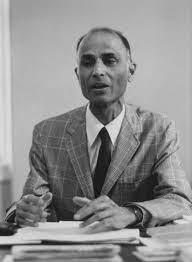For smooth Ad free experience
For smooth Ad free experience
He founded what was rare and uncharted in mathematics, now the world is indebted to him.

Died on 16th October 1983
It is often said that mathematics is closer to the truth than any other subject. Perhaps, the concrete proofs and systematic methods reveal more about the movements and energies than our philosophical speculations ever could.
This is not to say that other subjects are irrelevant, but a reminder to everyone that mathematics is not merely a subject confined to technical solutions or functional operations.
You'd think that most mathematicians would solve problems like a pro, never face any fears. But Harish Chandra was a prodigy with high-strung anxiety. Anyone who knew him could see it. There was an instance when he worried himself sick before an exam and ended up with a high fever. His genius wasn't confined to solving mathematical problems alone. Chandra immersed himself in painting and music to take unwind from the depth of the proofs.
Harish Chandra's career took a giant leap when he worked as a research student under Paul Dirac. His anti-colonialist views kept him from interacting with the English during his voyage to Cambridge. But once he reached, he had a newfound appreciation for their culture, the refinement, and adopted their customs. Later on, he did wonder if his English breakfast was the root of his health problems.
Nevertheless, during his time at Cambridge, Chandra found himself more interested in Dirac's weekly seminars than his lectures for they were a repetition of what was published in his book. It was in those seminars that he was drawn to the Representation Theory.
Pure mathematics is not for everyone. But Harish Chandra's calling lay in pure mathematics. When Dirac suggested that Harish compute the irreducible unitary representations of the Lorentz group, Harish made sure he completed the task. This earned him a Ph.D. from Cambridge.
Even though he was an analytical man, a genius compared to most of the people at that time, when he lamented to Dirac upon the mathematical shortcomings in a paper presented at Princeton , Dirac commented,
"I am not interested in proofs, but only in what nature does.”
It was only after that exchange that Harish Chandra realized that even though he was drawn to physics, he perhaps did not possess the sixth-sense to appreciate it. He switched to Mathematics.
This decision was especially difficult for him because changing careers after a significant period is often viewed with suspicions of failure. But even after changing lines, he did not lose his respect for physicists and physics. It was the strength of his character that led him to follow his beliefs, which perhaps was the right decision as well.
He was perhaps the first Indian mathematician who saw the evil in grading and ranking students upon their performance in a confined system. As a lecturer, Chandra found it tedious to grade papers. He found examinations to be futile and oppressive.
His reputation of being a tough lecturer earned him no audience during his lectures. However, the few who attended his discourses labelled it enriching and 'life-changing'. His work on Lie groups is significant. Mathematical induction was his method of proof, and he made use of all elements available to him. He used to say,
“Induction is like high finance: If you don’t borrow enough, you have cash flow problems; if you borrow too much, you can’t pay the interest.”
Over the course of his life, Chandra engaged in discussions with various scholars and had amicable connections with all of them. However, he got close to George Mackey. Even though they both had varying thoughts on the Representation theory, their friendship was warm and cordial that even extended to their families.
Chandra's friends and family say that had it not been for his wife Lily, he would not have accomplished what he did. His wife's support, love, and strength guided him through. When he worked, he sang. His tunes and tones would give an outsider a peek into his work's progress.
Unfortunately, due to increasing workload, stress, and dietary issues, he suffered from health problems. With each heart attack, his ability to work for long hours dropped significantly and that frustrated him. But his friends, colleagues and students remember him for having worked extensively on the Representational theory at a time when it was uncharted territory. A charismatic researcher, enthusiastic and always brimming with energy, ready to impart profound knowledge-He brought mathematics to life. Harish Chandra remains, as was quoted in the 1962 issue of the Columbia alumni magazine,
“possibly the finest mathematician that India has produced since Srinivasa Ramanujan.”
0
You might be interested in reading more from
